2016 United Nations Human Development Report For Nigeria. (UNDP HDR) - Politics - Nairaland
Nairaland Forum / Nairaland / General / Politics / 2016 United Nations Human Development Report For Nigeria. (UNDP HDR) (15274 Views)
Transcript Of President Buhari’s Speech At 72nd United Nations General Assembly / Senate Asks Presidency To Submit Confab Report For Consideration / El-Rufai & His Classmates At United Nations University-Merit, Netherlands (Pics) (2) (3) (4)
(1) (2) (3) (4) (5) (6) (Reply) (Go Down)
| 2016 United Nations Human Development Report For Nigeria. (UNDP HDR) by scholes0(m): 2:11pm On May 16, 2016 |
The preparation of this 2015 NHDR has been made possible by the contributions and support of many individuals and organizations who generously gave their valuable time and ideas. First and foremost is the UNDP Country Office in Nigeria for providing both financial and technical support right from inception. The team is particularly grateful for the unwavering guidance and support of the UNDP Nigeria team led by Pa Lamin Beyai (Country Director) and Ojijo Odhiambo (Senior Economic Advisor), Robert Asogwa (National Economist) and Grace Arinze-Ononwu (Economic Research Associate). A special appreciation is also due to Colleen Zamba (immediate former Economic Advisor), who provided valuable input at the onset of the process. The NHDR also benefited greatly from the advice and guidance of the former UNDP Resident Representative, Daouda Toure as well as the former Director-General of NISER, Prof. Olufemi Taiwo. 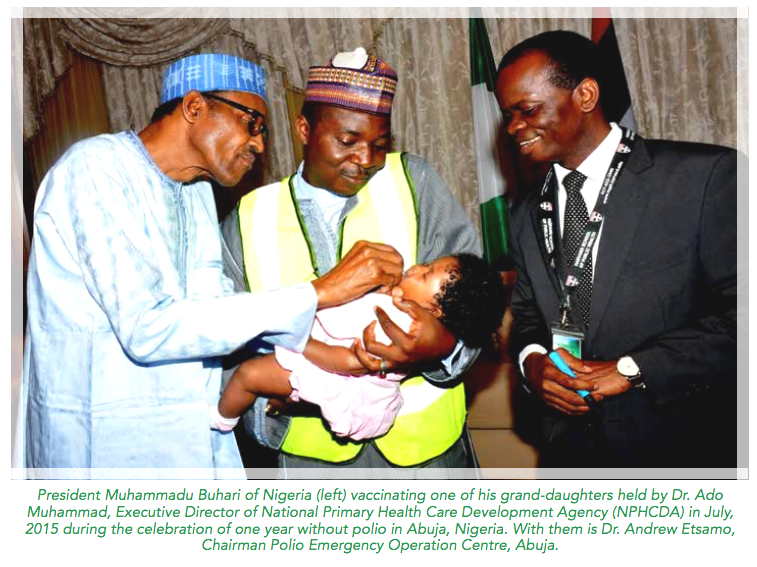 The following are the main points of the UNDP report on Nigeria. HEALTH * A long and Healthy Life : * Life expectancy index: LIFE EXPECTANCY INDEX FOR NIGERIA 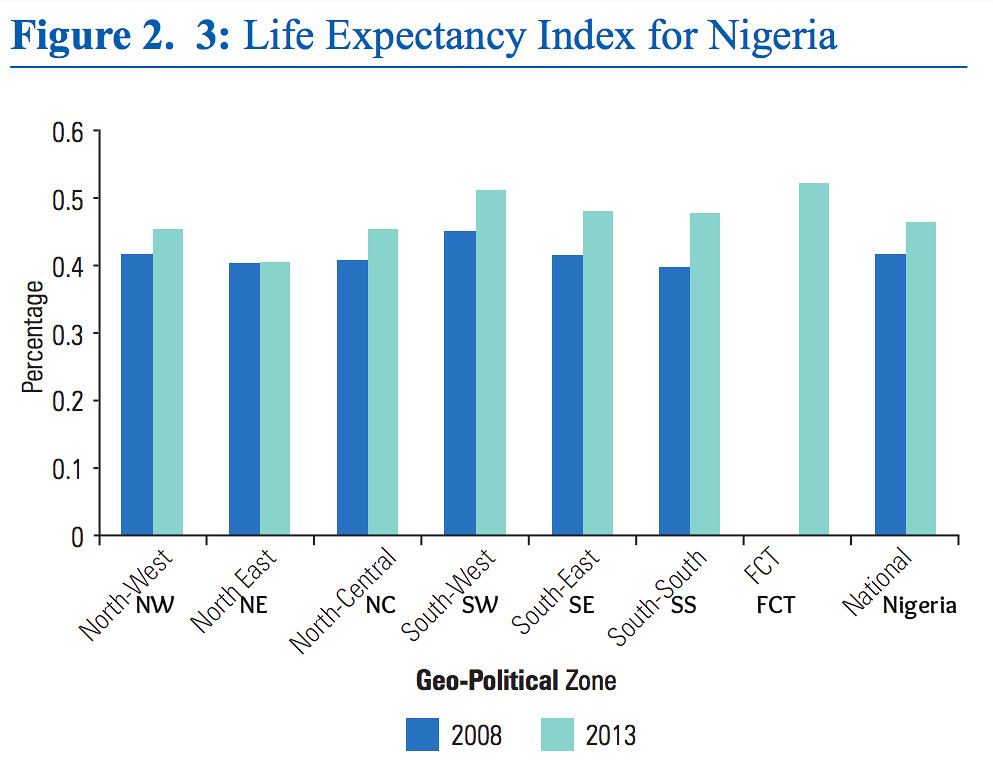 -------------------------------------------------------- EDUCATION * Knowledge, Learning and Literacy: MEAN YEARS OF SCHOOLING IN NIGERIA 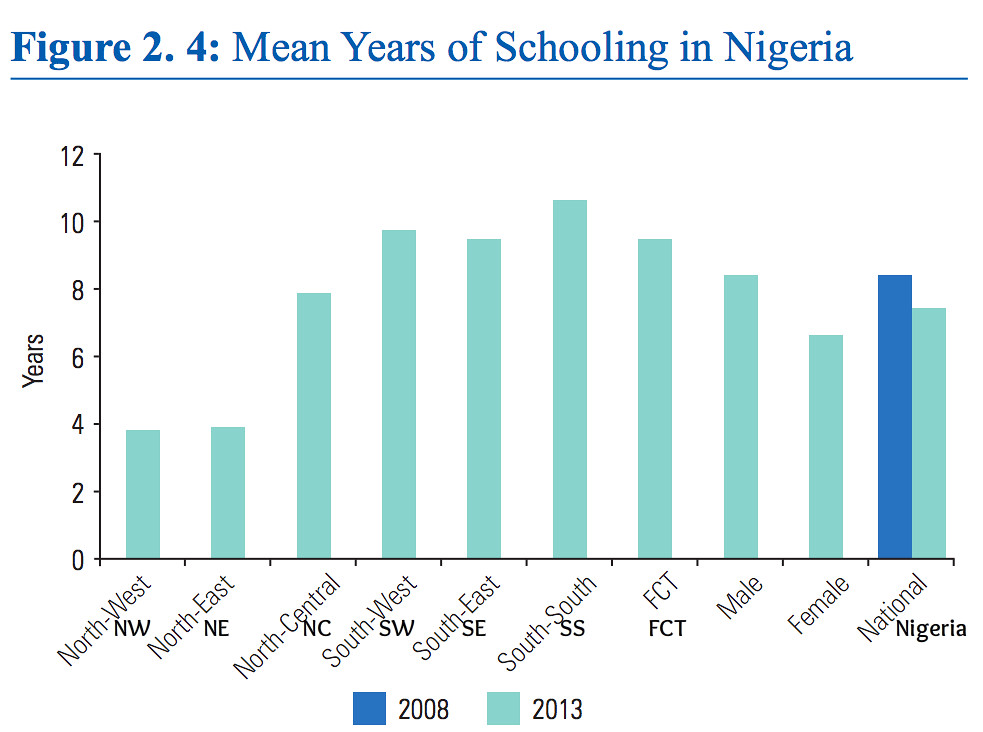 The educational index across geopolitical zones presented in Figure 2.5 shows there were declines in the North-West, North-East, in the FCT and in the nation as a whole between 2010 and 2013. However, other zones in the south and the North-Central zone experienced increase in the educational index. Educational Index was highest In the South-South zone, followed by the South West and then the South East Zone. It was lowest in the North West Zone Zone, and closely followed by the North East. NIGERIA'S EDUCATIONAL INDEX 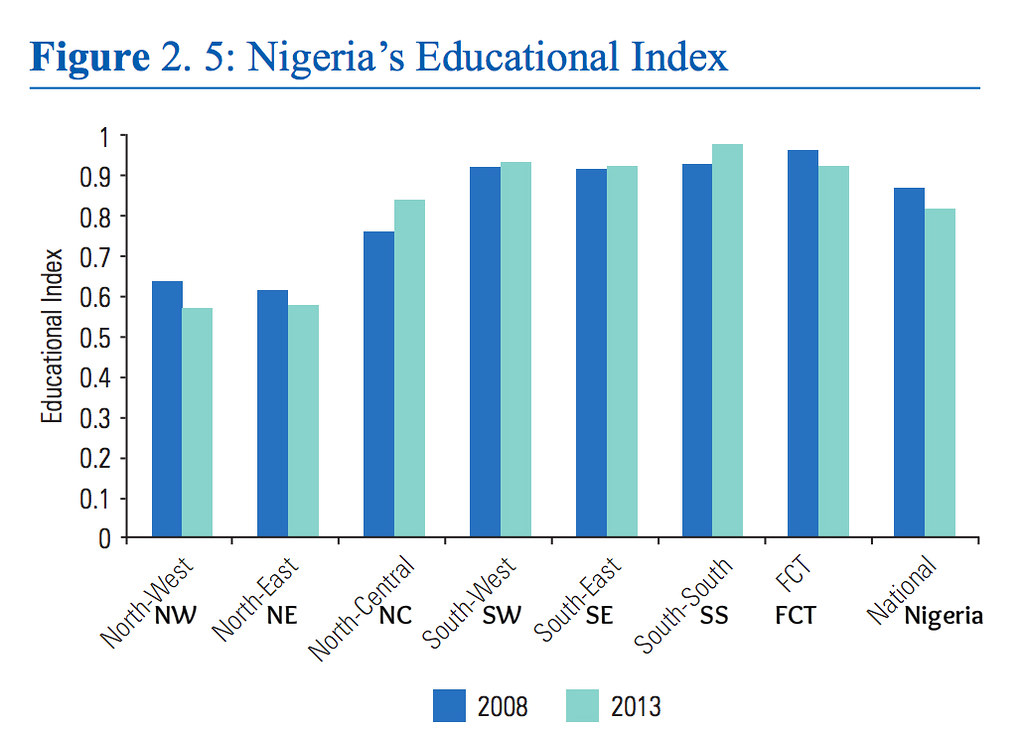 --------------------------------------------------------- WEALTH AND LIVING STANDARD * Income and a Decent Standard of Living: POVERTY INDEX RANKING FOR NIGERIA 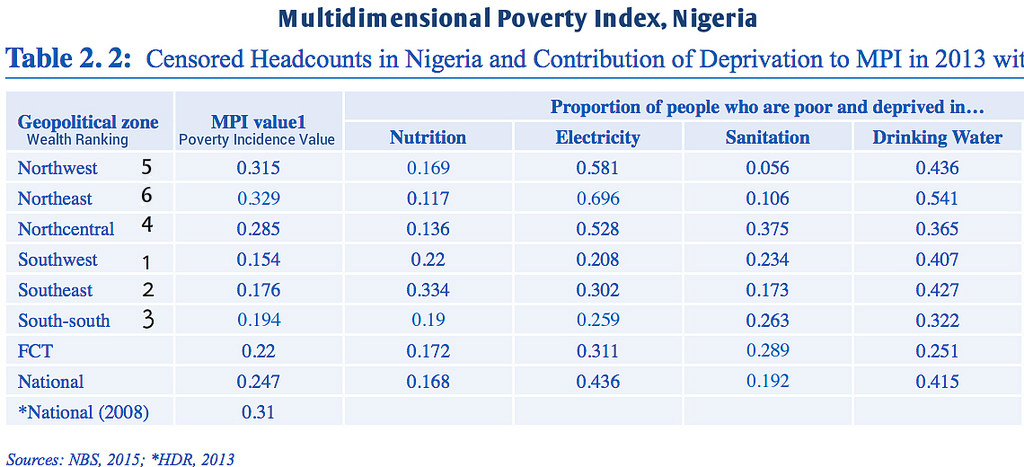 --------------------------------------------------------- GENDER EQUALITY * Gender Equality: GENDER INEQUALITY BY ZONES, NIGERIA 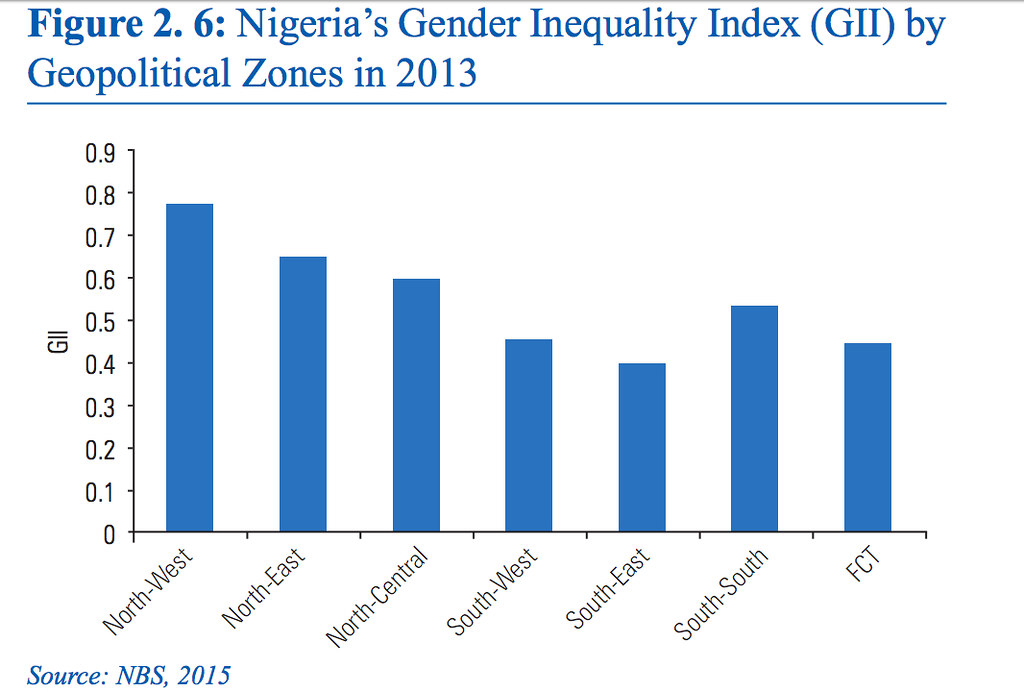 --------------------------------------------------------- WOMEN IN GAINFUL EMPLOYMENT OUTSIDE AGRICULTURE * Women in gainful employment: SHARE OF WOMEN IN WAGE EMPLOYMENT 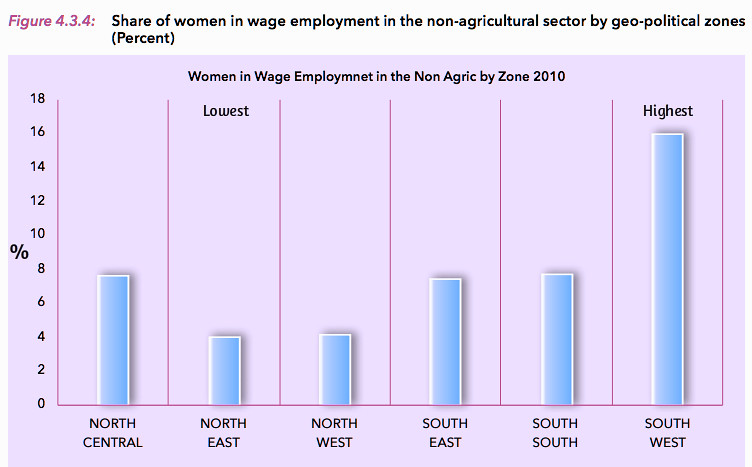 --------------------------------------------------------- POVERTY INCIDENCE BY TOTAL HEADCOUNT RATIO * Poverty Incidence (Headcount ratio): POVERTY PREVALENCE BY SECTORS AND ZONES 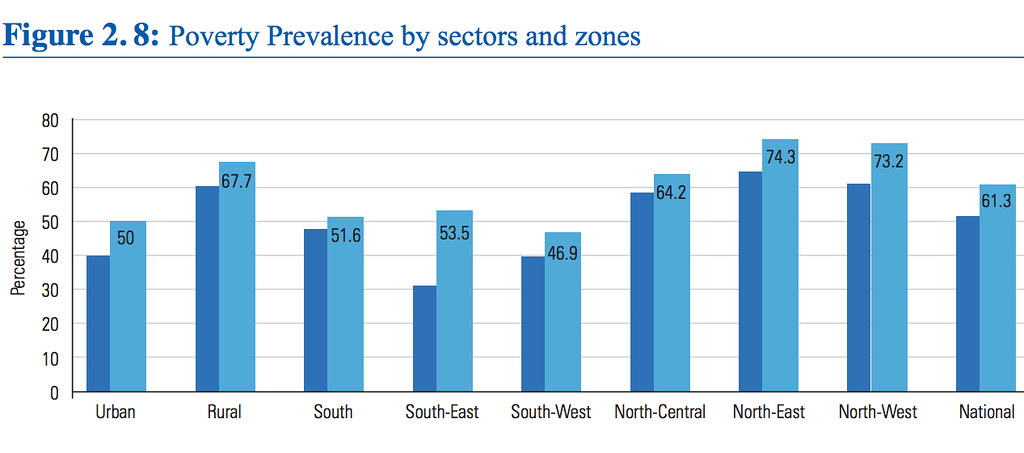 --------------------------------------------------------- POPULATION TO PUBLIC SPENDING RATIO * Spending on Education, Health and Public Administration: NATIONAL POPULATION SHARE AND EXPENDITURES ON EDUCATION, HEALTH & PUBLIC ADMIN 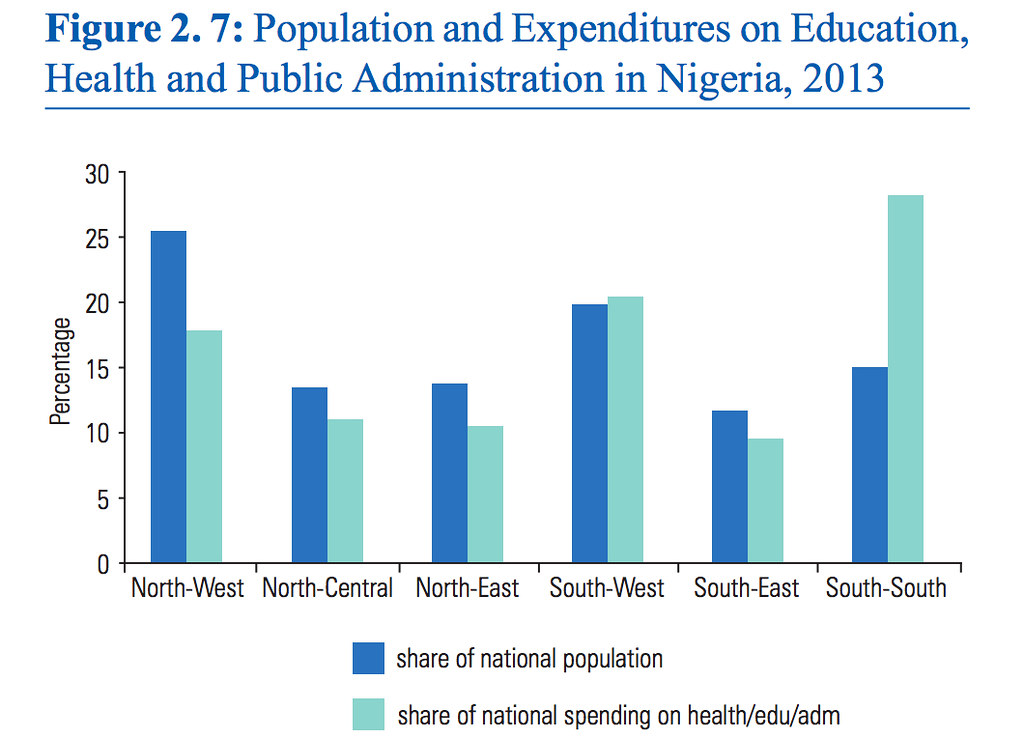 --------------------------------------------------------- INFANT MORTALITY * Child Mortality in Nigeria: INFANT MORTALITY RATES BY ZONES IN NIGERIA 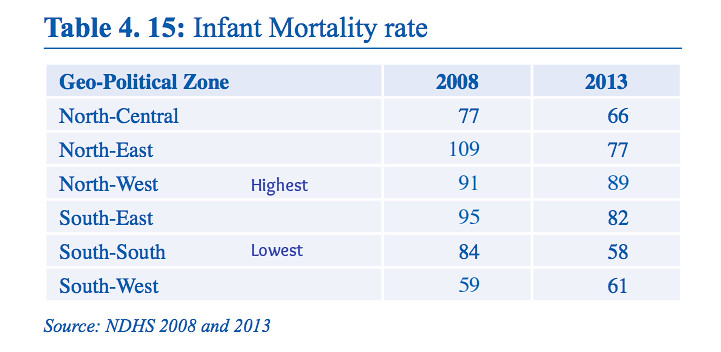 Under 5 mortality rate is highest in the North West (185 per 1,000 children), followed by the North East (160/1,000). It is lowest in the South West (90/1,000 children) followed closely by the South South (91/1,000) UNDER 5 MORTALITY RATES BY ZONES IN NIGERIA 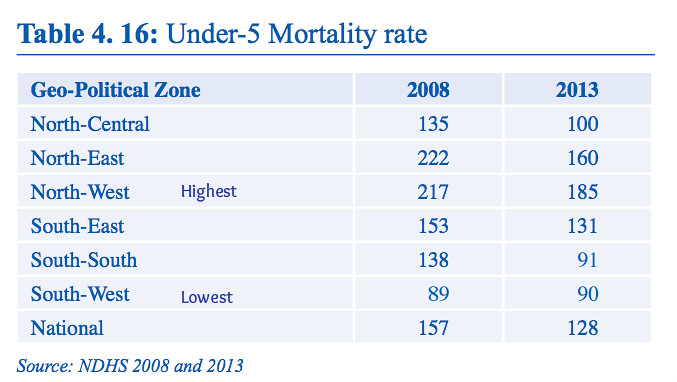 SOURCE: http://www.ng.undp.org/ Download Page: Research and Publications National Human Development Report, May 12, 2016. http://www.ng.undp.org/content/nigeria/en/home/library/ cc: Seun , Mynd44 , Lalasticlala This is very important 6 Likes 3 Shares |
| Re: 2016 United Nations Human Development Report For Nigeria. (UNDP HDR) by scholes0(m): 2:14pm On May 16, 2016 |
Kudos to the three Southern Zone of Nigeria for their strides towards development, but most especially the South West and the South-South Zones. May the North also improve in their socio-economic indices for a better Nigeria. 14 Likes 2 Shares |
| Re: 2016 United Nations Human Development Report For Nigeria. (UNDP HDR) by chriskosherbal(m): 2:15pm On May 16, 2016 |
A welcome development. |
| Re: 2016 United Nations Human Development Report For Nigeria. (UNDP HDR) by YourNemesis: 2:16pm On May 16, 2016 |
Errm, Isn't this the same UNDP report that one reporter claimed to say the South East was the safest Zone in Nigeria without providing and link to the report nor the methodology used in arriving at the conclusion? Thanks a lot, scholes0 11 Likes 1 Share |
| Re: 2016 United Nations Human Development Report For Nigeria. (UNDP HDR) by YonkijiSappo: 2:20pm On May 16, 2016 |
State breakdown nor dey ni? lumping the states into the geopolitical zones, will not let us see the individual strides made by each state towards development. A very bad or good performer in one region can bring averages down very quickly or boost averages unnecessarily. |
| Re: 2016 United Nations Human Development Report For Nigeria. (UNDP HDR) by scholes0(m): 2:25pm On May 16, 2016 |
YonkijiSappo: Abeg, it is better like this. Its high time we start thinking of ur regions as federating units. India with about 7 times our population has only 29 states and 7 Union territories. Indonesia with a bigger population (260 million) and bigger landmass that we do, has only 34 provinces. 7 Likes |
| Re: 2016 United Nations Human Development Report For Nigeria. (UNDP HDR) by kayfra: 2:53pm On May 16, 2016 |
Southern Nigeria continues to chart a distinct course of its own. Great strides from the SW, SS and SE in that order. 9 Likes 2 Shares |
| Re: 2016 United Nations Human Development Report For Nigeria. (UNDP HDR) by YoruBanger: 2:54pm On May 16, 2016 |
SW ahead of pack as usual.  12 Likes 2 Shares
|
| Re: 2016 United Nations Human Development Report For Nigeria. (UNDP HDR) by afroniger: 3:26pm On May 16, 2016 |
Kudos to the South. The North should work harder. Mynd44, Lalasticlala, food don done o. 2 Likes |
| Re: 2016 United Nations Human Development Report For Nigeria. (UNDP HDR) by Yorubanews: 3:41pm On May 16, 2016 |
Did anyone really expect SE to beat SW? All their noisemaking starts and ends online. SW will always be the Nigeria's golden egg. Why should Yotubas move to poverty ridden SE? Even with their miracle centers, they're still behind the SW 14 Likes 2 Shares |
| Re: 2016 United Nations Human Development Report For Nigeria. (UNDP HDR) by Rayhutar(m): 4:29pm On May 16, 2016 |
Yorubanews:Why is Nigeria too afraid to let them go, SW you are taking about have about 45% stake by Igbos, expecially in lagos and that is helping to push the statistics of SW up. 3 Likes |
| Re: 2016 United Nations Human Development Report For Nigeria. (UNDP HDR) by Yorubanews: 4:36pm On May 16, 2016 |
Rayhutar: Who is afraid to let Ibos go? We're holding on to the SS until oil dries up. Ibos are inconsequential. Last I heard, it was 99% stakes. What's the pride in leaving all your assets in another man's land while your region looks like dump? When Nigeria breaks, they can take their assets to Iboland. Lmao. Yes you're helping to push our crime rates up. Most of your criminals don port to the SW to make more money. Why do Ibos always claim the hardwork of Yoruba man? 11 Likes |
| Re: 2016 United Nations Human Development Report For Nigeria. (UNDP HDR) by OkutaNla: 4:40pm On May 16, 2016 |
Rayhutar: Lmao! Gosh! You folks never disappoint when it comes to pulling spurious percentages out of your anuses  . 45% ?? Come on, you can do better than that. Since it's a phantom figure, you might as well make it 95%. . 45% ?? Come on, you can do better than that. Since it's a phantom figure, you might as well make it 95%.   8 Likes |
| Re: 2016 United Nations Human Development Report For Nigeria. (UNDP HDR) by Yorubanews: 4:42pm On May 16, 2016 |
OkutaNla: I blame Yorubas for keeping mute when Ibos began these small lies. Tell them to replicate Lagos in Anambra. Tell them to force Yorubas to move their businesses to that erosive region. 8 Likes |
| Re: 2016 United Nations Human Development Report For Nigeria. (UNDP HDR) by scholes0(m): 4:45pm On May 16, 2016 |
...... |
| Re: 2016 United Nations Human Development Report For Nigeria. (UNDP HDR) by MrsNgoziKalu(f): 4:50pm On May 16, 2016 |
Accurate & Reliable Survey. This one isn't from igberetvnews.com  I always tell people that SS is the most stable & developed region after SW. But they won't chest beat, or try to shove their devlopment in people's throat Like some people. 10 Likes 1 Share |
| Re: 2016 United Nations Human Development Report For Nigeria. (UNDP HDR) by donphilopus: 4:53pm On May 16, 2016 |
Rayhutar: A very big mistake from you. It should be 150%. Thanks! 7 Likes |
| Re: 2016 United Nations Human Development Report For Nigeria. (UNDP HDR) by sparrowkid: 4:54pm On May 16, 2016 |
Good. |
| Re: 2016 United Nations Human Development Report For Nigeria. (UNDP HDR) by MrsNgoziKalu(f): 4:56pm On May 16, 2016 |
Yorubanews: Lol  Na today? since they migrated down to africa from israel, they have been helping people build their cities, but they have never had the time to build at least one in the place they are from. Lets be sincere with ourselves, which city in SE is in the league of Abj, Lag or PH? 7 Likes |
| Re: 2016 United Nations Human Development Report For Nigeria. (UNDP HDR) by donphilopus: 4:56pm On May 16, 2016 |
I can see why some peeps would always wanna attach themselves to the SS. God bless my region abeg!! 9 Likes 1 Share |
| Re: 2016 United Nations Human Development Report For Nigeria. (UNDP HDR) by MrsNgoziKalu(f): 4:57pm On May 16, 2016 |
Lalasticlala! Food don done oooo
 2 Likes |
| Re: 2016 United Nations Human Development Report For Nigeria. (UNDP HDR) by Yorubanews: 4:58pm On May 16, 2016 |
MrsNgoziKalu: Lol they're claiming that PH (igweocha) belongs to ibos. I pity SS people. By the time a group of 38million population is done grabbing lands from a population of 10million, dem go curse the day they joined Biafra. SS people may just end up living in their boats  7 Likes |
| Re: 2016 United Nations Human Development Report For Nigeria. (UNDP HDR) by MrsNgoziKalu(f): 5:06pm On May 16, 2016 |
Yorubanews: hahahaha. Awon ole I am posting from PH now. truth be told they are much in PH o. But most of them are into petty buisness like hawking boxers, okpa or Abasha. They will go to a city & hustle, but their children will come nairaland to boast how their parent owns the economy in the city. Yorubas have properties in PH than igbo, but igbos are more than them (Yoruba) 10 Likes 1 Share |
| Re: 2016 United Nations Human Development Report For Nigeria. (UNDP HDR) by Yorubanews: 5:10pm On May 16, 2016 |
MrsNgoziKalu: I've been hearing this from several SS people.  They have the audacity to compare their 2x2 corner shops with Yoruba business. Chaii insult. Yorubas, every tom and d*ck wan be like you. Wearing agbada and asoebi like you, speak Yoruba like you. When they know they can't be Yoruba, no matter how hard they try, they start hating on you. 3 Likes |
| Re: 2016 United Nations Human Development Report For Nigeria. (UNDP HDR) by Rayhutar(m): 5:17pm On May 16, 2016 |
Yorubanews:Lagos is no man's land 1 Like |
| Re: 2016 United Nations Human Development Report For Nigeria. (UNDP HDR) by Yorubanews: 5:18pm On May 16, 2016 |
Rayhutar: Lol when they fail at a rebuttal, they hang on to a delusion.  This is why Yorubas will continue to be successful in politics. No man's first name is Yoruba. This is why Yorubas will continue to be successful in politics. No man's first name is Yoruba.Oya go and eat. 5 Likes |
| Re: 2016 United Nations Human Development Report For Nigeria. (UNDP HDR) by Rayhutar(m): 5:21pm On May 16, 2016 |
MrsNgoziKalu:Abuja and Lagos is no man's land, developed by Nigeria, in terms of development you cant compare PH with Onitsha or Enugu 1 Like |
| Re: 2016 United Nations Human Development Report For Nigeria. (UNDP HDR) by Rayhutar(m): 5:27pm On May 16, 2016 |
Yorubanews:Remember that Lagos is not only indigenous to Yorubas, Egun and Ijaws are also, Lagos was former Benin Empire territory, developed with Nigeria money from 1960 to 1991, Abuja is receiving the same development not from oil money, after Gwari people will be telling us how their handwork developed Abuja. 2 Likes |
| Re: 2016 United Nations Human Development Report For Nigeria. (UNDP HDR) by MrsNgoziKalu(f): 5:30pm On May 16, 2016 |
Rayhutar: Lol, which onitsha? which Enugu? You are ma.D for that statement. inshort don't ever quote me again. Shove your lies in your brothers anus 7 Likes |
| Re: 2016 United Nations Human Development Report For Nigeria. (UNDP HDR) by Rayhutar(m): 5:32pm On May 16, 2016 |
Yorubanews:The British from 1851 and Nigeria from 1960-1991, build Lagos for all Nigerians, all Nigerians have a stake in Abuja and Lagos. 2 Likes |
| Re: 2016 United Nations Human Development Report For Nigeria. (UNDP HDR) by Yorubanews: 5:34pm On May 16, 2016 |
Rayhutar: No, Lagos is indigenous to Ibo and Hausas. Hey, do you know that we all migrated to the lands we currently owned? Aworis should teach us their Ibo dialect. Hausa used cocoa money to develop Lagos. Show us Lagos during colonial times and when it was a capital to Lagos now. Foreign investors/companies, loans, Yoruba businesses and leadership produced the Lagos it is now. Ibo petty trading couldn't even transform Aba talk less of Lagos state. 4 Likes |
| Re: 2016 United Nations Human Development Report For Nigeria. (UNDP HDR) by Yorubanews: 5:37pm On May 16, 2016 |
Rayhutar: Lmao...... Lekki/Ikoyi/VI/ the upcoming Eko Atlantic/etc were small huts during the times you mentioned. Go read your history books. British built Nigeria for all, but Yorubas made Lagos a mega city. You had Yorubas from all over the SW moving to Lagis and developing it. 4 Likes |
(1) (2) (3) (4) (5) (6) (Reply)
Why Saraki Always? What About Tinubu, Oshiomhole, Others? Frank Queries EFCC / Buhari Celebrates Yakubu Gowon On His 85th Birthday / Hakeem Odumosu: Pulling Out Ceremony Of Former Lagos Police Commissioner
(Go Up)
| Sections: politics (1) business autos (1) jobs (1) career education (1) romance computers phones travel sports fashion health religion celebs tv-movies music-radio literature webmasters programming techmarket Links: (1) (2) (3) (4) (5) (6) (7) (8) (9) (10) Nairaland - Copyright © 2005 - 2025 Oluwaseun Osewa. All rights reserved. See How To Advertise. 3 |